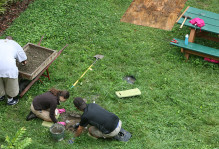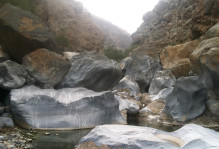Science Fiction: Economics in a Dystopian Future
In a Science Fiction, post-apocalyptic world, what would our 21st c society leave behind? What would economics look like?
As an economist, I often think about how the study of Economics ties into our overall experience as human beings. As someone who thrives on the dreams of futurists and the possibilities of Science Fiction, I often imagine how our modern-day society may be perceived millennia from now.
I attributed my Trekkie habits to my geekdom, but recently the US Army’s division of Training and Doctrine Command (TRADOC) issued a call for public participation in a Science Fiction writing contest to envision possible futures for which we may not be prepared. I was not the only one who daydreamed about future realities and the US Army apparently did also. So, how would we envision market economics of today in some dystopian fictional future?
Though we spend a good deal of our lives concerned about money, our wealth would have little importance in such a future. In today’s society, money largely represents the market value of our labor. We cannot store up our mental and physical exertions to be used later, but we can offer our mental and physical efforts to others who exchange these for tokens that we call money. In its cash form, cloth paper and metal, money would not have much value. In a dystopian future, digitized money of ones and zeroes in computer files disappears.
Many dystopian views of the future follow a societal collapse. Perhaps. If so, what in our 21st century society would be meaningful in such a future? Imagine no electronic media and a technological leap backwards for human society. Wagons could be more useful than Tesla electric sports cars; messages sent by hot air balloon transportation would be more efficient than email; and imports would once again depend upon merchants sailing the seas or crossing continents by ox or camel.
In such a world, books would be highly valued by those who were literate as electronic media disappeared. Perhaps much knowledge would be lost. Scarce, fragile photos would be a source of wonder.
Architecture would remain, though it all may need a good paint job. Sculpture would remain. People would wonder at those who created such grand and beautiful works. The mini-marts and strip malls had probably long since been dismantled to be repurposed for their building materials.
Music has been with human society since we first learned to hum and to beat two sticks, so music is something we could carry into our dystopian future. What songs from our era might remain? Probably those with the most repetitive lyrics and the catchiest tunes as these would be easy to remember. Imagine Daddy Yankee turned to dust hundreds of years in the past but people gather the harvest to “Shaky Shaky.”
Our dystopian progeny would appreciate our spendthrift over-consumption. Dumps and junk yards would be mined for materials no longer available. Found objects of simple enough design could be low-tech reverse-engineered and imitated.
Those things which we value as indicators of “economic success” would have crumbled, rotted, or just not be relevant. Creative expressions of art that were durable, architecture, printed books that were preserved, and music would remain and be prized. Interpreters of the past, actors and speakers, would be valued, as they shared preserved knowledge of their past, our past, present, and future. Imagine futuristic bards who travel from community to community to explain what Wall Street was and how people waited to hear a magical number called the “Dow Jones Industrial Average” every day.
While I enjoy Science Fiction, I am also an economist rooted in realism. In my mind, it is more likely that we will make our environment too toxic to support life or overheat the Earth and kill off ecosystems, before a disease or war cause a technological leap backwards that is common in dystopian literature. In that case, perhaps those who will be exploring our preserved literature, photo records, architecture and sculpture will be alien archaeologists – foreigners to our galaxy who study the remains of our planet’s civilizations. They too will probably be less impressed with 21st century indicators of wealth than with the creative expressions of human society.
Perhaps because we don’t relate to a dystopian future in which our careers and ambitions are no longer relevant, is why we don’t stop building golf courses or shopping centers instead of sculpture parks and don’t store great novels in materials preserved in liquid glass, or better yet, Starlite, instead of making more YouTube videos. If we did know our future and it was not a pretty one, our economic efforts would surely take a very different turn.
So you optimists, go make more cute cat videos and you pessimists, go vacuum seal great works (and liquidate your PayPal and Bitcoin assets). As a development economist, I believe in the power to make the world better, so I will join the optimists. I suppose this means I should begin posting cute kitty vids.
Comments are currently closed. Comments are closed on all posts older than one year, and for those in our archive.




I just published a book that explores political economy in a post-op cool pic dystopian scenario. It’s a quick read and I welcome your review. Traverse by BR549.